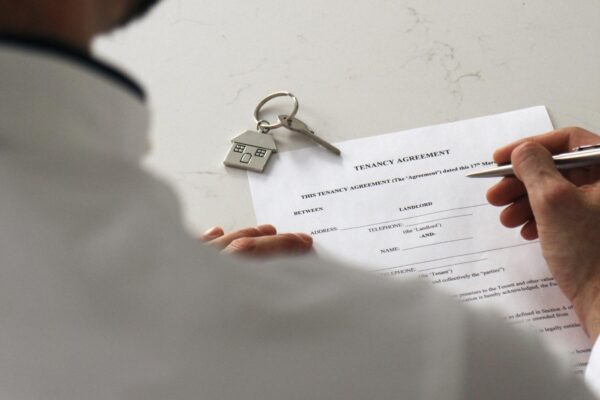Renting out a property in the UK can be an absolute minefield.
With such extensive and complex legislation, even for seasoned landlords, it can be very easy to unwittingly fall foul of the law.
To help you make sure that you’re always compliant we’re highlighting some little-known laws that can be expensive – and dangerous – for landlords to breach.
Did you know about prohibited payments under the Tenant Fees Act (2019)?
Landlords that use their own contracts are more likely to include illegal or unenforceable clauses.
The Tenant Fees Act 2019 (TFA) changed the rules around the fees that landlords can charge their tenants.
Charges for referencing, inventories, and professional cleaning used to be customary in rental contracts. But now, all payments are prohibited unless explicitly permitted under the legislation. Landlords and agents are now only allowed to charge fees for: late rent payments, replacing lost keys, and making changes to the tenancy. And even these are subject to specific limitations.
Landlords that don’t comply with these rules face fines of up to £5,000 for the first offence, and up to £30,000 and a banning order for the second offence.
If you use Rent Now – OpenRent’s tenancy setup service – we will provide you with a comprehensive, customisable, and legally sound contract. Our contract is periodically updated by legal professionals so you can be sure that all of the clauses are compliant and enforceable.
We want to make sure our landlords are aware that the TFA also applies to viewings. This summer it was reported that landlords have been charging tenants in order to view their properties. This is no longer legal as per permitted payments under the TFA.
You can read more about the TFA and permitted payments here.
What about the Deadline for Agreement (DfA)?
The DfA states that a new tenancy should be set up (the contract signed) within 15 days of the holding deposit having been paid by the tenants.
If you are found to have mishandled a holding deposit you could be charged with a fine of up to £5,000 and made to refund the holding deposit to the tenant.
If you use Rent Now, then you don’t need to worry about handling the holding deposit. We do this on your behalf so you avoid the risk of a fine or court action.
Landlords should always keep the DfA in the back of their minds once they have accepted a holding deposit, and especially if you are looking to make a claim.
If you would like to make a claim on the holding deposit under the grounds that the tenant pulled out of the tenancy before the DfA, then you must make your claim within 7 days of the deadline. If not, a court can make you return the holding deposit to the tenant, even if you would be otherwise eligible to make a claim. You can read about such a case which featured in the courts in January this year here.
If you use Rent Now we will let you know when the DfA is approaching and keep you informed of your eligibility to make a claim on the holding deposit.
You can read about how to extend the Deadline for Agreement here.
And the tenancy deposit? Do you know about the 30 day rule?
For properties that are rented out on an Assured Shorthold Tenancy, you must register any funds you receive towards the tenancy deposit and issue the prescribed information within 30 days.
This means that if your tenants pay one third of the deposit after the contract has been signed, but you agree for them to pay the rest closer to the move-in date – which is more than 30 days away – you could face a fine if you don’t register the initial payment.
Fines can equate to up to 3x the value of the deposit. This would potentially stack for renewals as well – i.e. if the deposit was not properly protected after the tenancy was initially set up, and the tenancy was then renewed twice, you could be facing a fine of up to 9x the deposit amount.
This is what nearly happened to one landlord in 2019 who failed to register the deposit for their tenancy when it was set up and for 7 subsequent renewals. The landlord finally registered the deposit 7 years after the beginning of the tenancy, but the prescribed information was never served.
Initially the court found that the landlord had breached the Housing Act 2004 a total of 16 times. The tenant was awarded £83,760 as a result – equating to 3x the deposit for each breach! This amount was reduced to £7,200 on appeal.
When using Rent Now, we handle all the initial funds. We protect the deposit for you with the government-approved deposit scheme, mydeposits, so you don’t need to worry about taking these steps yourself.
You can read the government advice about registering the deposit here and the prescribed information here.
Rent in advance vs deposit – what’s the difference?
Also relevant to the topic of deposits is the matter of rent in advance. You must be sure to avoid the possibility that any rent in advance could be considered an unprotected deposit.
Some landlords ask us whether they can take rent in advance and hold it for the duration of the tenancy. If you’re holding a month’s rent in advance while the tenants continue to pay rent on a monthly basis, then this could be construed as an unprotected deposit.
And as we know, not protecting the deposit is illegal – so be careful! As outlined above, you could be subject to fines of up to 3x the value of the ‘deposit’, even if you didn’t intend for the rent in advance to be treated as one.
You can read more about this here.
But don’t worry, with Rent Now, we handle all the initial funds and clearly specify which funds are rent and which are deposit.
And lastly, but not exhaustively, did you know that you’re legally required to provide your tenants with certain certificates?
A valid gas safety certificate, electrical installation report, and energy performance certificate must be provided to the tenants at the very start of your tenancy.
Not doing so can not only be extremely dangerous for tenants if you haven’t got valid certificates, but it can leave you vulnerable in terms of the law.
In February this year, one landlord was fined after it came to light that they had failed to ensure that the gas appliances, fitting and flues had been checked at a group of flats they were renting out. After pleading guilty to breaching Regulation 36(3)(b) of the Gas (Installation and Use) Regulations 1998, they were fined £4,500 and ordered to pay a Victim Surcharge of £175.
Failing to provide these certificates at the start of your tenancy can also affect your ability to serve a Section 21 and recover possession of your property.
For example, if you fail to provide the tenants with a copy of the EPC when you are required to do so, then your Section 21 may be rejected and any possession application thrown out at court.
If that happens, landlords might have to wait another 2 months’ notice, plus a further 6 months or more for the case to be re-heard; during which time the tenants might not be paying rent. This could mean losses of tens of thousands of pounds, not including legal costs.
With Rent Now we will remind you to check that you have all of the required certification in place before the start of your tenancy and allow you to set reminders for those that need renewing.
If you are missing any, you can view the services we offer on our website.
If you’re not sure about any of the above, don’t worry. At OpenRent, we’ve got you covered.
With Rent Now – OpenRent’s tenancy creation service – we deal with all aspects of tenancy creation so that you don’t need to worry about a thing.
We provide you with a contract which is reviewed at regular intervals by our legal experts and updated in accordance with the latest housing legislation.
OpenRent will also handle all funds during the process, providing you with updates with regards to the Deadline for Agreement, protecting the tenancy deposit, and handling any holding deposit disputes.
Finally, we also serve the prescribed information and How to Rent guide on your behalf, and remind you with regards to your legal obligations at the start of your tenancy.
Please note that the information in this article is focused on the legislation in England, which can be different from those in other UK nations.
Information in this article is by way of general guidance only and may not apply in your particular circumstances. You should not make any decisions to act or refrain from acting based on information in this article without seeking independent legal advice.




There are many mistakes landlords make before letting a property like
These are some basic mistakes many landlords do before letting their property. To get the best deal on letting property landlords need to approach professional real estate agents to get the information.
Or get the wrong information
I thoroughly disagree re the agent. I have found most agents to be thoroughly incompetent and money grabbing (eg making secret commissions on any work needed despite the fact they have already charged you for managing the property) and I do a better job myself. Good agents are hard to find!
I agree, though agents do tend to make landlord aware of markups on contractor fees. IE 10%. What some sneaky ones do is issue an invoice direct at a massive inflated price, after screwing down contractor to rock bottom price.
Great if you can do without them, a necessary evil for many.
The ones I’ve used never admitted to a mark up. They did it an underhanded way. The contractor would invoice them, say £100 and would then issue a credit for £10, so the agent would only pay £90 but would have an invoice for £100 to show the landlord.
The never told me that’s what they did, but I’m an accountant and I did the accounts for a couple of their contractors, so saw it happen!